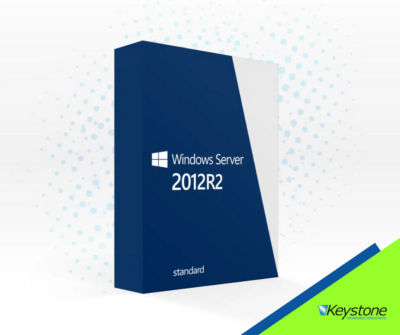Special Guest column by Rick Wuebker, Rick is one of Keystone’s support team engineers helping clients use technology. He has a long history in the mobile phone business.
Buying a new smartphone can be a lot of fun. There are a number of different OS options available to try out and each has its advantages and disadvantages. The disadvantages, though, can often not become apparent until you’ve already settled on a phone and discover where you’ve gone wrong.
As I said, there are a number of different options available the world over but in the US we basically keep to 4 major players; Apple’s iOS, Blackberry, Android and Windows. Of the 4, iOS and Android seem to be the most popular and with good reason but Windows may surprise you.
APPLE iOS (iPhone)
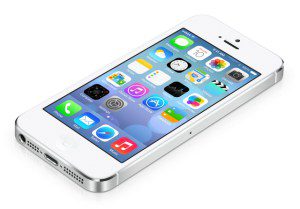 Apple’s iOS is probably the easiest operating system to use. Its simplicity is perfect for users who are new to the smartphone market – users who may otherwise be overwhelmed by the idea of replacing the ol’ flip phone with this new fancier device. One complaint of longtime users is that iOS really hasn’t changed dramatically in years. Last year’s release of iOS7 saw a slightly updated look and some more streamlined mail set up, as well as minor changes like added camera filters and a live clock icon that actually moves.
Apple’s iOS is probably the easiest operating system to use. Its simplicity is perfect for users who are new to the smartphone market – users who may otherwise be overwhelmed by the idea of replacing the ol’ flip phone with this new fancier device. One complaint of longtime users is that iOS really hasn’t changed dramatically in years. Last year’s release of iOS7 saw a slightly updated look and some more streamlined mail set up, as well as minor changes like added camera filters and a live clock icon that actually moves.
These are not the only changes, but honestly nothing terribly mind blowing was changed and that’s not always a bad thing. Because Apple hasn’t been trying to reinvent the wheel with their iPhones, they’ve actually maintained what I consider to be the strongest operating system out there. Any major flaws were fixed years ago and new features are just icing on a pretty delicious cake. In fact, even Apple Maps was fixed for the newest operating systems and it works pretty darned good.
ANDROID
Google’s Android operating system is usually considered by tech nerds to be the more superior operating system because it is constantly being updated, it’s more customizable and because it’s not tied down to one manufacturer (Samsung, LG, Motorola, etc. all make Android model phones) the phone’s look and feel can be quite different from one device to another. Because of this, Android phones are also available at various prices so you can go all out with a Samsung Galaxy S4 for around $200 on contract or you can get a more modestly priced version for less than $100 – some free on contract.
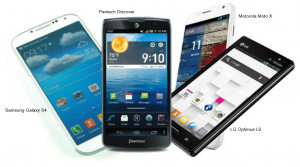 I’ve used, or at least tinkered around with, all the major smartphone operating systems available in the US at one point or another and I like Android for many reasons. But as a tech support person, I would avoid recommending them if you rely on your phone to sync your contacts, schedule, etc. to your computer’s email client (ex. Outlook). We get more calls about problems syncing calendars and contacts with Android phones than with any other smartphones and while it will eventually get better there is not yet a good solution to these problems.
I’ve used, or at least tinkered around with, all the major smartphone operating systems available in the US at one point or another and I like Android for many reasons. But as a tech support person, I would avoid recommending them if you rely on your phone to sync your contacts, schedule, etc. to your computer’s email client (ex. Outlook). We get more calls about problems syncing calendars and contacts with Android phones than with any other smartphones and while it will eventually get better there is not yet a good solution to these problems.
BLACKBERRY
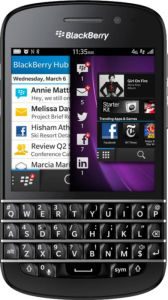 I’m going to keep this short and sweet, or at least try to… at one time Blackberry phones were the perfect device for corporate users. Their email system and security was second to none and is still quite good. However, it appears they can’t figure out what to do with their phones, their software or their company. There are always going to be Blackberry loyalists who will claim them to be the best, but the company appears to be a sinking ship and I wouldn’t recommend putting your money into one of their devices unless they are able to get themselves out of the downward spiral they’re in.
I’m going to keep this short and sweet, or at least try to… at one time Blackberry phones were the perfect device for corporate users. Their email system and security was second to none and is still quite good. However, it appears they can’t figure out what to do with their phones, their software or their company. There are always going to be Blackberry loyalists who will claim them to be the best, but the company appears to be a sinking ship and I wouldn’t recommend putting your money into one of their devices unless they are able to get themselves out of the downward spiral they’re in.
WINDOWS
Anyone familiar with Windows Mobile phones back in the early 2000’s will probably not look back on them too fondly. They were a mess. I remember trying to sell them while working for an AT&T store. At the time my store couldn’t carry iPhones and Android hadn’t yet been released. It was either Windows, or Blackberry (or Symbian found on some Sony and Nokia phones). By that time, even Palm OS was not selling. So customers unable to buy an iPhone in my store looked to Blackberry and Windows phones. I should say, they looked to Blackberry. Some had already owned Windows phones and hated them. Some had friends with Windows phones and wanted no part of it. Others bought Windows phones from me and returned them within days. They were bad phones – bad software and bad hardware.
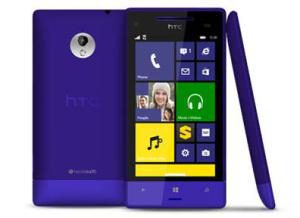 Things are different today. Microsoft learned from their earlier mistakes and introduced new phones in 2010. Starting with Windows Phone 7, minimum hardware requirements were placed on manufacturers in order to ensure the hardware would run the new improved software without the glitches, problems and failures of the previous incarnations of Windows Phone software. Despite the incredible advancements of these new phones (in user interface, email, text messaging and web browsing among others) the first models that came out only sold “ok” as consumers were still a little leery of Windows phones. By the time Windows Phone 8 was released in October 2012 features such as Multitasking, Internet Explorer 10, Rooms (for group messaging) and NFC/Wallet had been added.
Things are different today. Microsoft learned from their earlier mistakes and introduced new phones in 2010. Starting with Windows Phone 7, minimum hardware requirements were placed on manufacturers in order to ensure the hardware would run the new improved software without the glitches, problems and failures of the previous incarnations of Windows Phone software. Despite the incredible advancements of these new phones (in user interface, email, text messaging and web browsing among others) the first models that came out only sold “ok” as consumers were still a little leery of Windows phones. By the time Windows Phone 8 was released in October 2012 features such as Multitasking, Internet Explorer 10, Rooms (for group messaging) and NFC/Wallet had been added.
My honest opinion is that if you’re looking for a corporate use smartphone and don’t want an iPhone, forego the Android and Blackberry phones and get a Windows Phone. There are lots of nice features. The email client works great and syncs better than Android.




